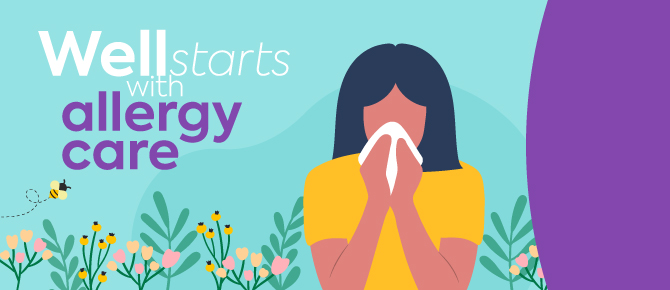Pediatric Allergy & Immunology at Wellstar Children's Hospital of Georgia
Wellstar Children’s Hospital of Georgia offers expert pediatric care for children with allergies and asthma.
Expert Care for Children with Allergies & Asthma
If your child is suffering from allergies, asthma or reoccurring sinus infections, we’re here to help. Count on the expert care, education and support from leading healthcare professionals at Wellstar Children’s Hospital of Georgia. Our nationally recognized, board-certified physicians specialize in allergy, asthma and immunology care. Children and families benefit from our team approach to patient-centered care. We coordinate care by communicating with your primary care physicians; ear, nose and throat specialists; dermatologists and other experts to create the best treatment plan for each child. Child Life Specialists, medical social workers, respiratory therapists and certified asthma educators are also important members of our team.Helpful Information
Conditions We Treat
Allergy symptoms can be wide-ranging. We see children for many kinds of allergic reactions including:- Anaphylaxis, a severe, life-threatening allergic reaction
- Asthma and breathing problems caused by swelling of the airway after exposure to allergy triggers
- Chronic hives and swelling, which may be otherwise unexplained
- Drug reactions, the immune system’s reaction to medication—nonprescription, prescription or herbal
- Eosinophilic esophagitis, allergic reactions in the esophagus
- Food allergies, which can cause a range of symptoms
- Immune deficiency, which leaves them more sensitive to germs that cause infections
- Insect sting allergies (venom), which can cause rashes or difficulty breathing
- Sinus issues and nasal allergies causing congestion, runny nose and sneezing
- Skin reactions such as hives and eczema that result from coming in contact with an allergy trigger
Identify Allergies Early
Allergies happen when the body’s immune system reacts strongly to something it considers a threat. These reactions can cause discomfort such as swelling of the airways, hands and feet, watery eyes, coughing and breathing problems, or itchy raised skin rashes. Sometimes reactions can be severe and cause a patient to go into anaphylactic shock. For children with asthma, reactions can cause narrowing or tightening of the airways and, sometimes, mucus build-up, causing life-threatening asthma attacks. It’s important to identify allergens—and your child’s reaction to them—as soon as possible so your child can be more comfortable and you can put your mind at ease. We help diagnose:- Food allergies to things like peanuts and tree nuts, wheat, milk or eggs
- Venom allergies to stinging insects such as bees, wasps, hornets and fire ants
- Environmental allergies to pollens, indoor dust, mold or animals
- Drug allergies to penicillin and other drugs
Diagnostic Tests
We use the latest tests and procedures to diagnose and treat children with asthma and other allergic diseases, including:- Blood tests, to see if antibodies called IgE are produced by an allergen
- Breathing assessments, in our Pulmonary Function Testing Lab to test lung function
- Immune deficiency evaluations, to determine why a person has repeated or unusual infections
- Skin tests, by either a pin prick (most common) or injection under the skin of a small amount of allergen
- Venom testing, for insect sting allergy
- Food and drug allergy testing and challenges
Our dedicated labs and centers
Many of the diagnostic tests are available in our medical offices. If additional assessment is needed, your child may have a pulmonary function test (PFT) to diagnose breathing disorders or identify triggers, such as exercise-induced asthma.Treatment & Management
Allergic symptoms disrupt sleep, play and life in general. We work with you and your child to find the solution to better breathing and comfort so your child can enjoy life again. In case of an after-hours emergency, patients have 24/7 access to physicians.Treatments we offer
- Advice/education on allergen avoidance or reduction based on test results
- Allergen immunotherapy, a series of allergy shots given to reduce allergic reactions
- Biologic therapies such as monoclonal antibodies to treat severe allergic disorders
- Inhalers, to treat long-term symptoms as well as sudden onset breathing difficulty
- Medication management
- Peak flow meter, to measure how fast you can blow air out of your lungs to help determine medication levels
- Venom desensitization, to reduce life-threatening allergic reactions to insect stings
Additional Support for Your Child
Depending on your child’s condition, we have a team of people to help your family cope and manage the condition, including medical social workers, patient educators and Child Life Specialists. Child Life Specialists are always available to talk and help your child understand and cope with their condition and treatment. These healthcare professionals help reduce anxiety, fear, pain and misconceptions about medical experiences. For children with asthma, a patient educator works with them to develop individualized asthma care plans to manage and treat their symptoms.Do I need a referral to see a pediatric allergist?
No, appointments with a pediatric allergist do not require a referral.

